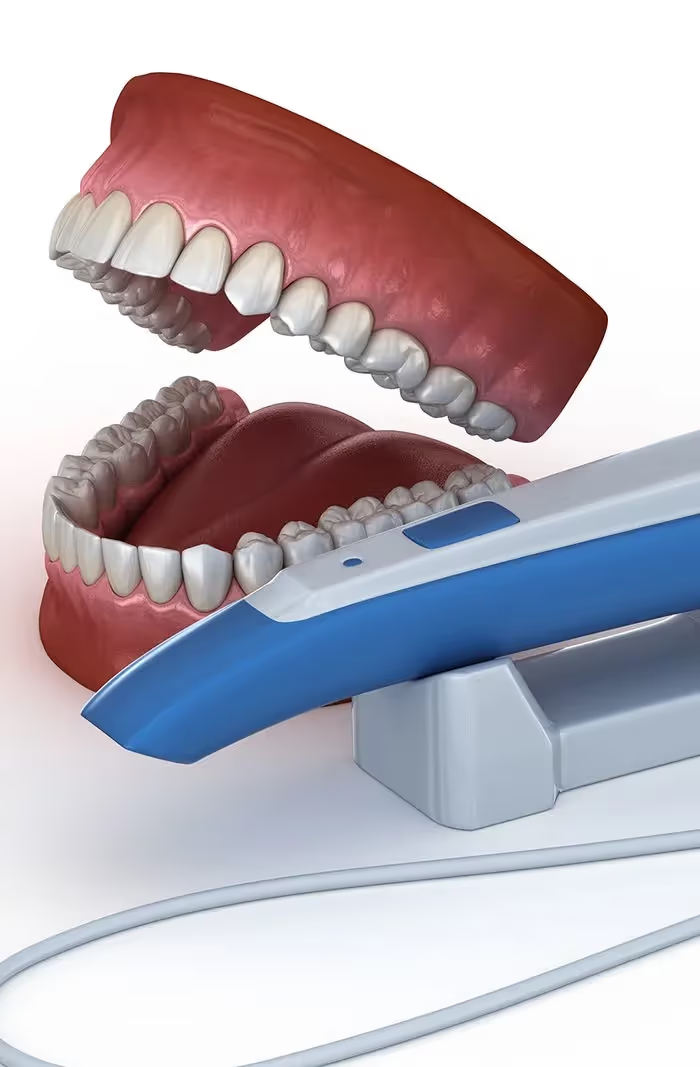
Dental Crowns in Culver City
Don’t let damage or decay stop you from having the beautiful, functional smile you deserve. A natural-looking, durable dental crown can restore both the health and appearance of your tooth.
Why should I choose dental crowns?
Dental crowns are a versatile solution for both restorative and cosmetic needs. They’re the go-to treatment for those with damaged, broken, or severely decayed teeth. After clearing away the damage and shaping the tooth into a strong base, a crown is placed over it. These custom-made, tooth-shaped caps protect your natural tooth down to the gum line, preserving your smile’s look, feel, and functionality. Crowns are also frequently used after root canal therapy or to complete a dental implant procedure.

Intraoral Scanner = Mess-Free Treatment
You can say goodbye to goopy impressions thanks to our 3D Intraoral Scanner. This tool allows us to capture images and create models of your teeth. It’s a fully digital process — no putty necessary.

Did you know…
Dental crowns can be made out of metals, porcelain, resin, and ceramics.
Source: Cleveland Clinic
Ready to
schedule your appointment?
schedule your appointment?
The Benefits of Dental Crowns
Maintains Natural Tooth Structure
Crowns safeguard the remaining natural tooth and root structure once the decay has been removed.
Matches Your Natural Smile
Custom lab-made crowns are crafted to match the look and feel of your natural teeth, ensuring they blend seamlessly with your smile.
Durable & Longlasting
With proper care, a well-made crown can last up to 15 years. Talk to your dentist about tips to maximize the lifespan of your new crown.
The Dental Crown Treatment Process
Preparing The Tooth
To begin, your dentist will thoroughly clean your mouth and apply local anesthesia for your comfort. Next, the decayed enamel will be carefully removed with a dental drill. This step also involves reshaping your tooth to create a strong foundation for the dental crown.
Imaging & Temporary Crown Placement
The creation of your custom crown starts with capturing impressions of your teeth. For a natural fit, we’ll also take detailed images of your teeth for precise matching. Your impressions are then sent to a dental lab, where your crown will be expertly crafted using durable materials. In the meantime, your dentist will place a temporary crown to protect your reshaped tooth until your permanent crown is ready.
Final Fit & Finish
Once your permanent crown is complete, we’ll schedule your final fitting. During this appointment, our team will thoroughly check the crown’s fit and comfort, making any necessary adjustments. Once everything feels right, your dentist will securely bond the crown in place with a strong dental adhesive, completing the process.
Before & Afters
A smile is worth 1,000 words.
See real patient success stories.
%20(1).avif)
%20(1).avif)
Crowns
Faqs
Frequently Asked Questions
Check out these frequently asked questions, or call us to speak with our team.
Dental crowns are a common solution for treating teeth that have been impacted by decay or damage. Patients with severe cavities and those who have experienced dental trauma, resulting in cracked, chipped, or broken teeth may also benefit from a dental crown. Additionally, individuals who have undergone root canal therapy often require a crown to complete the procedure as it serves to protect the tooth from future problems by capping it down to the gumline.Crowns can also be used to restore the shape, appearance, and functionality of teeth. They can be used in cosmetic cases as an alternative to veneers or dental bonding.
If you are experiencing pain, discomfort, or have visible damage or discoloration in your teeth due to decay or trauma, you may be a candidate for a dental crown. It’s always necessary to consult with your dentist to see if a crown can help address your oral health concerns.
When crafted and placed correctly, dental crowns have the potential to last up to 15 years. Maintaining good oral hygiene habits, such as brushing your teeth twice daily and flossing once daily, along with regular dental check-ups and cleanings every 6 months, can contribute to the longevity of your crown.
Caring for your dental crown is simple and similar to caring for your natural teeth. Implementing a routine of brushing for at least two minutes twice daily and flossing at least once, especially before bed, is crucial for maintaining the health of your crown. Regular dental visits every six months and avoiding consumption of excessively hard or sticky foods can also aid in preserving the longevity of your dental crown.
Dental crowns that are recommended as a restorative treatment are often covered by insurance policies. The amount of coverage, and how much you will have to pay, will vary based on your plan. Dental crowns for cosmetic purposes may not be covered by insurance. Check with your dental insurance provider to find out if dental crowns are covered under your policy.



